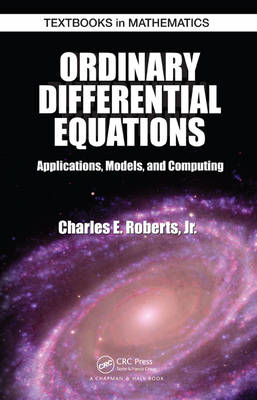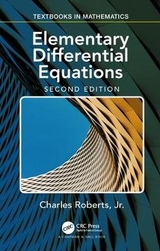
Ordinary Differential Equations
Taylor & Francis Inc (Verlag)
978-1-4398-1908-1 (ISBN)
- Titel erscheint in neuer Auflage
- Artikel merken
In the traditional curriculum, students rarely study nonlinear differential equations and nonlinear systems due to the difficulty or impossibility of computing explicit solutions manually. Although the theory associated with nonlinear systems is advanced, generating a numerical solution with a computer and interpreting that solution are fairly elementary. Bringing the computer into the classroom, Ordinary Differential Equations: Applications, Models, and Computing emphasizes the use of computer software in teaching differential equations.
Providing an even balance between theory, computer solution, and application, the text discusses the theorems and applications of the first-order initial value problem, including learning theory models, population growth models, epidemic models, and chemical reactions. It then examines the theory for n-th order linear differential equations and the Laplace transform and its properties, before addressing several linear differential equations with constant coefficients that arise in physical and electrical systems. The author also presents systems of first-order differential equations as well as linear systems with constant coefficients that arise in physical systems, such as coupled spring-mass systems, pendulum systems, the path of an electron, and mixture problems. The final chapter introduces techniques for determining the behavior of solutions to systems of first-order differential equations without first finding the solutions.
Designed to be independent of any particular software package, the book includes a CD-ROM with the software used to generate the solutions and graphs for the examples. The appendices contain complete instructions for running the software. A solutions manual is available for qualifying instructors.
Charles E. Roberts, Jr. is a professor in the Department of Mathematics and Computer Science at Indiana State University.
Introduction
Historical Prologue
Definitions and Terminology
Solutions and Problems
A Nobel Prize Winning Application
The Initial Value Problem y′ = f (x, y); y(c) =d
Direction Fields
Fundamental Theorems
Solution of Simple First-Order Differential Equations
Numerical Solution
Applications of the Initial Value Problem y′ = f (x, y); y(c) =d
Calculus Revisited
Learning Theory Models
Population Models
Simple Epidemic Models
Falling Bodies
Mixture Problems
Curves of Pursuit
Chemical Reactions
N-th Order Linear Differential Equations
Basic Theory
Roots of Polynomials
Homogeneous Linear Equations with Constant Coefficients
Nonhomogeneous Linear Equations with Constant Coefficients
Initial Value Problems
The Laplace Transform Method
The Laplace Transform and Its Properties
Using the Laplace Transform and Its Inverse to Solve Initial Value Problems
Convolution and the Laplace Transform
The Unit Function and Time-Delay Functions
Impulse Functions
Applications of Linear Differential Equations with Constant Coefficients
Second-Order Differential Equations
Higher Order Differential Equations
Systems of First-Order Differential Equations
Linear Systems of First-Order Differential Equations
Matrices and Vectors
Eigenvalues and Eigenvectors
Linear Systems with Constant Coefficients
Applications of Linear Systems with Constant Coefficients
Coupled Spring-Mass Systems
Pendulum Systems
The Path of an Electron
Mixture Problems
Applications of Systems of Equations
Richardson’s Arms Race Model
Phase-Plane Portraits
Modified Richardson’s Arms Race Models
Lanchester’s Combat Models
Models for Interacting Species
Epidemics
Pendulums
Duffing’s Equation
Van der Pol’s Equation
Mixture Problems
The Restricted Three-Body Problem
Appendix A: CSODE User’s Guide
Appendix B: PORTRAIT User’s Guide
Appendix C: Laplace Transforms
Answers to Selected Exercises
References
Index
| Erscheint lt. Verlag | 5.4.2010 |
|---|---|
| Reihe/Serie | Textbooks in Mathematics |
| Zusatzinfo | Equation heavy manuscript; 13 Tables, black and white; 149 Illustrations, black and white |
| Verlagsort | Washington |
| Sprache | englisch |
| Maße | 156 x 234 mm |
| Gewicht | 998 g |
| Themenwelt | Mathematik / Informatik ► Mathematik ► Analysis |
| Mathematik / Informatik ► Mathematik ► Angewandte Mathematik | |
| Naturwissenschaften ► Physik / Astronomie | |
| ISBN-10 | 1-4398-1908-4 / 1439819084 |
| ISBN-13 | 978-1-4398-1908-1 / 9781439819081 |
| Zustand | Neuware |
| Informationen gemäß Produktsicherheitsverordnung (GPSR) | |
| Haben Sie eine Frage zum Produkt? |
aus dem Bereich



